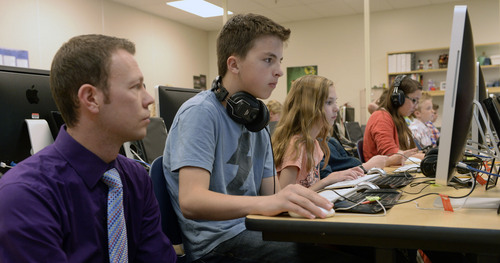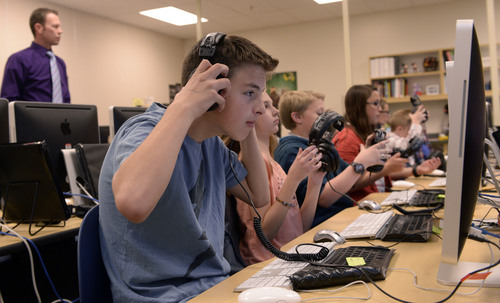This is an archived article that was published on sltrib.com in 2014, and information in the article may be outdated. It is provided only for personal research purposes and may not be reprinted.
This month and next, hundreds of thousands of Utah students will sit before computers to take new state tests.
At least several hundred others, however, will simply sit the whole thing out.
Some Utah school districts are reporting higher numbers this year of parents opting their kids out of new state testing — known as SAGE. Parents have always had the right to keep their kids from testing, but this year's higher numbers come amid anxiety over the new assessments.
The state school board decided Friday not to count students who opt out when calculating school grades, so as not to penalize schools. But questions remain about how opt-outs might affect teacher evaluations and federal tracking of Utah school progress.
"You can't say there's no effect because there is," Judy Park, state associate superintendent, said about kids opting out. "That's just the reality."
Parent concerns include the content of the questions, high stakes testing in general, data collection and Common Core State Standards, on which the test questions are based.
"If you don't want your child to be subject to something, the state doesn't have a right to come in and interfere," said Oak Norton, with the group Utahns Against Common Core. Norton has opted his middle-schooler out of testing this year.
But Park and some school administrators say many of the fears over SAGE testing are unfounded — which they believe most parents realize.
They say the tests are more rigorous than old state tests, known as CRTs, and will help parents and teachers better gauge the strengths and weaknesses of their students.
The tests are computer adaptive, which means when a student answers a question wrong, the next question might be easier; and if he answers it correctly, the next one might be harder. State leaders have been working to implement them for years as an improvement over old-fashioned fill-in-the-bubble tests.
"I think the vast majority are very pleased, very comfortable," Park said of Utahns' feelings toward the tests. Critics are "just a small, very vocal minority."
—
More parents saying 'no' • So far, Alpine School District has seen one of the larger jumps in the number of parents keeping their children from testing. As of Wednesday, 412 Alpine students had been opted out, up from just 35 last year.
Still, it's a tiny fraction of Alpine's 72,000 total students.
Smaller districts are seeing smaller numbers. As of last week, about 64 children had been opted out of SAGE testing in the Jordan District, about 15 to 20 students in Canyons District, nine kids in the Granite District and anywhere from a couple of students per school to more than half a dozen families per school in Provo's district.
Last year, fewer than 200 students statewide opted out of state math, science and language arts tests, according to the state Office of Education.
Previously, students whose parents opted them out of tests would automatically receive scores of nonproficient, possibly dinging a school's overall grade.
But the governor recently signed SB122 into law, protecting schools and teachers from being negatively affected if a student opts out of a test. The state school board decided Friday, in an attempt to comply with that new law, to no longer assign scores at all to students who opt out.
But some board members worried that opt-outs could hurt teacher evaluations that include student test data. For example, if a teacher's five highest-scoring students opted out, that would affect the teacher's evaluation even if those kids aren't given scores.
"It puts teachers in an untenable position," said state Deputy Superintendent Brenda Hales. "A year from now part of their pay is going to be based on how kids are performing on tests, and if they don't have all the people they work with in their ...sample, how can we rely on that to evaluate a teacher? And yet the law says we have to."
Board member Dave Thomas on Friday proposed asking bill sponsor Sen. Aaron Osmond to consider future changes to resolve that issue.
—
A new way to skip • Many districts have also, for the first time this year, created official forms for parents to opt out. Some, such as Canyons and Provo, explain to parents what they're missing.
The Canyons form has parents acknowledge that SAGE results are used "to review student progress toward learning targets, plan instruction, provide teacher feedback, inform potential course placement, and allow for public reporting about school quality."
Ben Horsley, Granite spokesman, said Granite created its form this year after receiving generic forms parents downloaded from websites.
"Recognizing there was an organized effort to have parents opt their kids out of SAGE testing and computer-adaptive testing mostly related to the Common Core," Horsley said, "we wanted to create our own form to do so."
The Common Core academic standards outline what students should learn in each grade in math and English to be ready for college and careers. Critics worry they're impeding local control and not rigorous enough, while proponents say schools maintain control over curriculum and the standards are more rigorous than Utah's old ones.
Christel Swasey, with Utahns Against Common Core, said the standards are one reason she opted her high-schooler out of SAGE testing this year.
"The tests are based on what I consider to be illegitimate academic standards," Swasey said.
The website for Utahns Against Common Core offers a link to a two-page opt-out form that includes many of the arguments some parents have made against SAGE. Norton said the link has been shared nearly 500 times on Facebook.
The form letter says parents are shunning the tests to protect their children from behavioral testing and to avoid having their individual scores shared with the federal government and private entities.
—
Fear vs. facts • Those arguments, however, simply don't hold water, Park said.
Some parents have been worried because the company that helped create the test, American Institutes for Research, describes itself as a "behavioral and social science research and evaluation" organization.
But Park said the company's behavioral research is separate from its contract with Utah for SAGE, which tests only academic skills.
Some parents also worry their children's personal information is being shared with the U.S. government.
Park, however, said only aggregate data — about children as groups, not individuals — is sent to the federal government, as it has been for years, including when the state gave CRTs.
Ray Morgan, Provo assistant superintendent, agreed.
"We've been performing this kind of test since 1998 and there hasn't been negative reaction to that that I was aware of until this year," Morgan said, "and I believe that's connected to information or ideas people have connected to the Common Core."
A panel of 15 Utah parents spent a week last year reading thousands of questions, flagging anything questionable. Still, some parents remain concerned, unhappy that they're not allowed to see them.
Utah Common Core opponents have pointed to a Utah student's cellphone photo of one SAGE question as evidence of warped content.
The question asked students to imagine they lived in an alternate world where video games were invented before books and considered superior to books, citing several reasons. Students were asked to write an essay in response, addressing opposing viewpoints.
Park said the question is being described out of context and notes the parent review panel did not find it inappropriate. It can't be used now that it has been photographed and revealed, which violated testing rules, she said. The state Office of Education is still investigating.
Some districts, such as Alpine, have been holding parent meetings, trying to make sure parents get the facts.
"We're trying to address some of those concerns by letting parents know," said Alpine spokesman John Patten, "really this is a test created by Utah for Utah."
Kristen Moulton contributed to this story.
No more fill-in-the-bubble
The name of Utah's new SAGE tests stands for Student Assessment of Growth and Excellence. Read more about these computer adaptive tests at http://bit.ly/1dZGEFh.



















